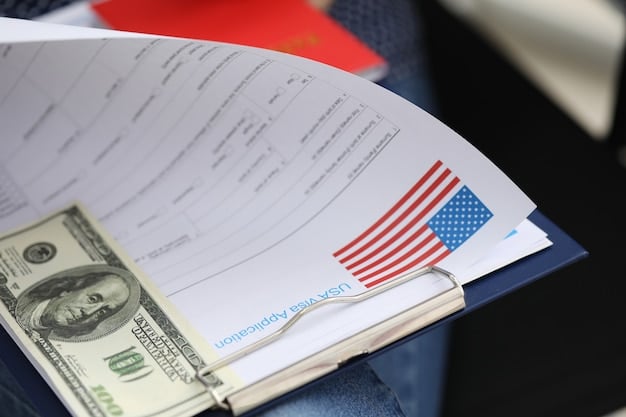Federal Tax Overhaul 2025: What’s the Latest News?

The proposed federal tax overhaul for 2025 is currently under discussion, with potential changes to individual and corporate tax rates, deductions, and credits impacting taxpayers and businesses across the United States.
Navigating the complexities of tax law can be daunting, especially when a major overhaul is on the horizon. The proposed federal tax overhaul for 2025 has the potential to significantly impact individuals and businesses alike. Let’s delve into the latest developments and what you need to know to prepare.
Understanding the Impetus Behind the 2025 Tax Overhaul
The discussion around a federal tax overhaul for 2025 stems from several key factors. Many provisions of the 2017 Tax Cuts and Jobs Act (TCJA) are scheduled to expire at the end of 2025, necessitating congressional action to either extend, modify, or replace them.
This impending expiration, coupled with evolving economic priorities and political considerations, is driving the current debate. Understanding these underlying factors is crucial to grasping the potential scope and impact of the proposed changes.
The Sunset Provisions of the 2017 Tax Cuts and Jobs Act
The TCJA, enacted in 2017, introduced significant changes to the U.S. tax code, including reduced individual and corporate income tax rates. However, many of these changes were designed to be temporary, with sunset provisions set to take effect after 2025. This means that without further legislation, tax laws will revert to their pre-2018 state, potentially leading to higher tax burdens for many Americans.
Economic and Political Drivers of Tax Reform
Beyond the sunset provisions, broader economic and political considerations are fueling the tax overhaul debate. Some policymakers argue for tax reforms to stimulate economic growth, encourage investment, and address income inequality. Others prioritize fiscal responsibility and seek to raise revenue to reduce the national debt. These competing priorities shape the different proposals and perspectives surrounding the 2025 tax overhaul.
- Expiration of key TCJA provisions creating a need for legislative action.
- Potential impact on individual and corporate tax rates.
- Economic goals such as stimulating growth, investment, and addressing income inequality.
- Political considerations related to fiscal responsibility and national debt reduction.
In essence, the potential for significant tax law changes, driven by expiring provisions and competing economic and political objectives, makes the 2025 federal tax overhaul a critical issue for taxpayers and businesses to monitor.
Key Areas Potentially Affected by the Tax Overhaul
The proposed federal tax overhaul is likely to touch upon several key areas of the tax code. These areas include individual income tax rates, corporate tax rates, deductions and credits, and estate and gift taxes. Changes in these areas could have wide-ranging effects on taxpayers and the economy.
Understanding these potential areas of impact is essential for individuals and businesses to assess their potential tax liabilities and plan accordingly. Let’s examine these key areas in more detail.

Individual Income Tax Rates
The individual income tax rates established by the TCJA are scheduled to revert to their pre-2018 levels after 2025. The tax overhaul debate centers on whether to extend the current rates, modify them, or implement a new rate structure altogether. Different proposals could affect taxpayers in different income brackets, potentially leading to higher or lower tax liabilities depending on their individual circumstances.
Corporate Tax Rates
The TCJA significantly reduced the corporate income tax rate from 35% to 21%. The future of this reduced rate is a key point of contention in the tax overhaul debate. Some argue for maintaining the lower rate to encourage business investment and job creation, while others advocate for raising it to generate more government revenue.
- Individual income tax rates and potential changes to tax brackets.
- Corporate tax rates and their impact on business investment.
- Deductions and credits, including the standard deduction and itemized deductions.
- Estate and gift taxes and potential changes to exemption amounts.
In summary, the federal tax overhaul for 2025 has the potential to reshape key aspects of the U.S. tax system, impacting individuals and businesses in significant ways. Monitoring these key areas will be crucial for staying informed and making informed financial decisions.
Potential Scenarios and Proposed Changes
As the debate over the federal tax overhaul for 2025 intensifies, several potential scenarios and proposed changes are emerging. These scenarios range from extending the current TCJA provisions to implementing entirely new tax structures.
Examining these different possibilities is crucial for understanding the potential range of outcomes and their implications. Let’s delve into some of the key scenarios that are being discussed.
Extending the 2017 Tax Cuts and Jobs Act
One potential scenario involves extending the current provisions of the TCJA, preventing the sunset provisions from taking effect. This would maintain the existing individual and corporate income tax rates, as well as other provisions of the 2017 law. Proponents of this approach argue that it would provide stability and certainty for taxpayers and businesses.
Modifying the TCJA Provisions
Another possible scenario involves modifying certain provisions of the TCJA while allowing others to expire. This approach could involve adjusting individual income tax rates, altering deductions and credits, or making changes to the corporate tax rate. Modifications could be designed to address specific concerns, such as income inequality or the national debt.
- Extending the current TCJA provisions to maintain the status quo.
- Modifying the TCJA provisions to address specific concerns.
- Implementing a new tax structure altogether.
- Potential impact on different taxpayer groups and economic sectors.
In conclusion, the federal tax overhaul for 2025 could take many different forms, from simply extending the current law to implementing entirely new tax policies. Understanding these potential scenarios is essential for anticipating the potential impact on your personal finances or business operations.
The Role of Political Factors and Negotiations
The ultimate shape of the federal tax overhaul for 2025 will depend heavily on political factors and negotiations. The political landscape, including the composition of Congress and the White House, will influence the priorities and perspectives that shape the debate.
Bipartisan cooperation, or the lack thereof, will play a critical role in determining whether a comprehensive tax overhaul can be achieved. Understanding the political dynamics at play is essential for following the development of this critical legislation.
Bipartisan Cooperation and Potential Obstacles
A successful tax overhaul typically requires bipartisan cooperation, as tax laws have far-reaching implications for the economy and individual taxpayers. However, achieving consensus on tax policy can be challenging, as different political parties often have competing priorities and ideologies. The ability of lawmakers to bridge these divides will be crucial in shaping the final outcome.
Presidential Influence and Veto Power
The President of the United States also plays a significant role in the tax overhaul process. The President can influence the debate through policy proposals, public statements, and negotiations with Congress. The President also has the power to veto legislation, which can be a powerful tool in shaping the final bill.

- The influence of the political landscape on tax policy priorities.
- The need for bipartisan cooperation to achieve a tax overhaul.
- The role of presidential influence and veto power.
- Potential obstacles to reaching a compromise.
In short, the federal tax overhaul for 2025 is not simply a matter of economic policy. Political factors, including bipartisan cooperation and presidential influence, will significantly shape the final outcome. Monitoring these political dynamics is essential for understanding the development of this legislation.
Strategies for Individuals and Businesses to Prepare
Given the uncertainty surrounding the federal tax overhaul for 2025, it’s crucial for individuals and businesses to take proactive steps to prepare. Waiting until the last minute to react to changes in the tax code could be costly.
By understanding the potential scenarios and implementing sound tax planning strategies, you can minimize your tax liability and protect your financial interests. Let’s explore some specific strategies for individuals and businesses.
Reviewing Your Current Tax Situation
The first step in preparing for the tax overhaul is to thoroughly review your current tax situation. This includes evaluating your income, deductions, credits, and overall tax liability. Understanding your current situation will provide a baseline for assessing the potential impact of any future tax changes.
Consulting with a Tax Professional
Navigating the complexities of tax law can be challenging, especially when a major overhaul is on the horizon. Consulting with a qualified tax professional can provide valuable insights and guidance. A tax professional can help you assess your potential tax liabilities under different scenarios and develop strategies to minimize your tax burden.
- Reviewing your current tax situation to identify potential areas of impact.
- Consulting with a tax professional for personalized advice.
- Adjusting investment strategies to minimize tax liabilities.
- Taking advantage of existing tax-saving opportunities.
In conclusion, the 2025 federal tax overhaul presents both challenges and opportunities for individuals and businesses. By staying informed, seeking professional guidance, and implementing proactive tax planning strategies, you can navigate this period of uncertainty and position yourself for financial success.
Staying Informed: Resources and Updates
Keeping up with the latest developments in the federal tax overhaul for 2025 is crucial for individuals and businesses alike. The tax landscape is constantly evolving, and staying informed is essential for making sound financial decisions.
There are numerous resources available to help you stay up-to-date on the latest tax news and policy changes. Let’s explore some of the most valuable resources.
Official Government Websites and Publications
Official government websites, such as the IRS website, are valuable sources of information on tax law and policy. These websites provide access to tax forms, publications, and other resources. They also offer updates on tax law changes and announcements.
News Media and Financial Publications
Reliable news media outlets and financial publications can provide valuable insights and analysis on the tax overhaul debate. These sources often feature articles, reports, and expert commentary on the potential impact of different tax proposals.
- Official government websites and publications.
- News media and financial publications.
- Tax professional organizations and associations.
- Webinars and online resources.
In summary, staying informed about the proposed federal tax overhaul for 2025 requires a proactive approach. By utilizing a variety of resources and staying engaged in the debate, you can position yourself to make informed financial decisions and adapt to any potential changes in the tax code.
| Key Point | Brief Description |
|---|---|
| 🗓️ TCJA Expiration | Many provisions of the 2017 Tax Cuts and Jobs Act expire in 2025. |
| 💰 Tax Rates | Potential changes to Individual and Corporate Tax Rates are being discussed. |
| 🏛️Political Factors | Bipartisan cooperation will heavily influence any tax overhaul. |
| 💼 Preparation | Individuals and businesses should review tax situations and consult professionals. |
FAQ
▼
The primary driver is the scheduled expiration of many provisions from the 2017 Tax Cuts and Jobs Act (TCJA) at the end of 2025, requiring Congress to act.
▼
Individual income tax rates could change depending on whether the current TCJA rates are extended, modified, or replaced with a new rate structure.
▼
Potential scenarios include extending the TCJA, modifying some of its provisions, or implementing an entirely new tax structure altogether.
▼
Tax laws have broad economic and individual implications, making bipartisan agreement key to achieving a comprehensive and effective tax overhaul.
▼
To prepare, individuals and businesses should review their current tax situation, consult with tax professionals, and stay informed about the latest developments.
Conclusion
The proposed federal tax overhaul for 2025 presents a significant opportunity to reshape the US tax system. As discussions continue and potential changes emerge, staying informed, consulting with professionals, and proactive planning will be essential for navigating the evolving tax landscape.






